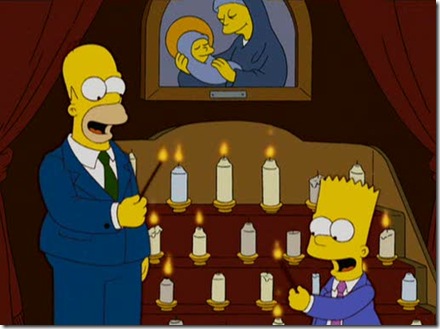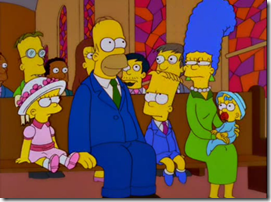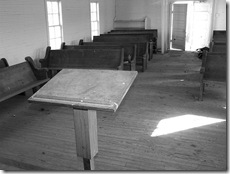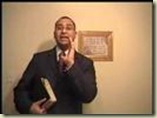 “Few people know it, and he does everything to hide it. But it's true: Homer J. Simpson is Catholic,” declares the Vatican newspaper L'Osservatore Romano in an article titled “Homer and Bart are Catholics.” The article praises the show for including Catholic content like prayer before meals and belief in the afterlife. The newspaper cited a study by a Jesuit priest of a 2005 episode of the show called "The Father, the Son and the Holy Guest Star" (Season 16, Episode 21). His study concludes that "The Simpsons" is "among the few TV programs for kids in which Christian faith, religion and questions about God are recurrent themes." (Source material for this and the next two paragraphs taken from the many newspapers running this story right now, including The Toronto Star, The Telegraph, The Daily Mail Online and Entertainment Weekly.)
“Few people know it, and he does everything to hide it. But it's true: Homer J. Simpson is Catholic,” declares the Vatican newspaper L'Osservatore Romano in an article titled “Homer and Bart are Catholics.” The article praises the show for including Catholic content like prayer before meals and belief in the afterlife. The newspaper cited a study by a Jesuit priest of a 2005 episode of the show called "The Father, the Son and the Holy Guest Star" (Season 16, Episode 21). His study concludes that "The Simpsons" is "among the few TV programs for kids in which Christian faith, religion and questions about God are recurrent themes." (Source material for this and the next two paragraphs taken from the many newspapers running this story right now, including The Toronto Star, The Telegraph, The Daily Mail Online and Entertainment Weekly.)
 The episode starts with Bart being expelled from Springfield Elementary School and being enrolled in a Catholic school where he meets a sympathetic priest, voiced by the actor Liam Neeson, who draws him into Roman Catholicism with his kindness. Then, Homer—wooed in part by the twin powers of pancake suppers and absolution of his sins—decides to convert to Catholicism, to the horror of his wife Marge, the Rev Lovejoy and Ned Flanders.
The episode starts with Bart being expelled from Springfield Elementary School and being enrolled in a Catholic school where he meets a sympathetic priest, voiced by the actor Liam Neeson, who draws him into Roman Catholicism with his kindness. Then, Homer—wooed in part by the twin powers of pancake suppers and absolution of his sins—decides to convert to Catholicism, to the horror of his wife Marge, the Rev Lovejoy and Ned Flanders.
 If you’re thinking that the crew who produces The Simpsons might respond swiftly to a Vatican newspaper declaring Homer and Bart to be Catholic, you’d be right! “My first reaction is shock and awe,” said Executive Producer Al Jean. “We've pretty clearly shown that Homer is not Catholic.” Jean explains, 'I really don't think he could go without eating meat on Fridays—for even an hour.” The executive producer pointed out that the Simpson family attends the First Church of Springfield ‘which is decidedly Presbylutheran.’ Regarding the episode in question, Jean pointed out that Homer and Bart only considered converting.
If you’re thinking that the crew who produces The Simpsons might respond swiftly to a Vatican newspaper declaring Homer and Bart to be Catholic, you’d be right! “My first reaction is shock and awe,” said Executive Producer Al Jean. “We've pretty clearly shown that Homer is not Catholic.” Jean explains, 'I really don't think he could go without eating meat on Fridays—for even an hour.” The executive producer pointed out that the Simpson family attends the First Church of Springfield ‘which is decidedly Presbylutheran.’ Regarding the episode in question, Jean pointed out that Homer and Bart only considered converting.
With the media running wild on this story, I guess no one bothered to actually read the whole article in L'Osservatore Romano which admits that Homer and Bart flirt with the idea of converting to Catholicism, and Homer makes an outrageous confession to Liam Neeson, but ultimately Homer decides against converting to Catholicism, uttering “a cathartic D'oh!”
 Perhaps the Catholic newspaper was attempting to gain for the Roman Catholic Church some of the attention their rival, the Anglican Church, received three years ago when it endorsed The Simpsons. Rowan Williams, the Archbishop of Canterbury, spoke of his admiration for The Simpsons and even compared himself to Homer Simpson—the resemblance is striking! In 2004, Williams was reported to have been approached to appear on the show. The Archbishop said that the show was “generally on the side of the angels and on the side of sense. It punctures lots of pompous fictions about how the world works.” The Church of England sent out a book called Mixing it up with The Simpsons to youth advisers in every diocese in the country. It urged youth workers to set up screens in their churches to show episodes of the world's most popular cartoon that deal with key Christian themes such as punishment,
Perhaps the Catholic newspaper was attempting to gain for the Roman Catholic Church some of the attention their rival, the Anglican Church, received three years ago when it endorsed The Simpsons. Rowan Williams, the Archbishop of Canterbury, spoke of his admiration for The Simpsons and even compared himself to Homer Simpson—the resemblance is striking! In 2004, Williams was reported to have been approached to appear on the show. The Archbishop said that the show was “generally on the side of the angels and on the side of sense. It punctures lots of pompous fictions about how the world works.” The Church of England sent out a book called Mixing it up with The Simpsons to youth advisers in every diocese in the country. It urged youth workers to set up screens in their churches to show episodes of the world's most popular cartoon that deal with key Christian themes such as punishment, love and the Second Coming. (The book also suggested activities to challenge teenagers, like putting out an open box of donuts with a sign saying “Do not touch” to test whether they can resist temptation!) This is all quite interesting, but it’s also clear that Homer is no more an Anglican than he was a Catholic. (For more on this Anglican story, see The Daily Mail Online.)
love and the Second Coming. (The book also suggested activities to challenge teenagers, like putting out an open box of donuts with a sign saying “Do not touch” to test whether they can resist temptation!) This is all quite interesting, but it’s also clear that Homer is no more an Anglican than he was a Catholic. (For more on this Anglican story, see The Daily Mail Online.)
Given that The Simpsons spans 22 seasons of episodes, it was a little unfair for the Jesuit study and Vatican newspaper to make observations based on only one episode! Looking at the show as a whole, what can we say about Homer Simpson’s take on Christianity? To answer that question, I’ll be draw extensively from an article by the sociologist (and dynamic evangelical speaker) Tony Campolo (his words will appear in italics).
 Campolo says that Homer is a great example what sociologists call folk religion. He is the kind of religious person who goes to church regularly, but is in reality more into a religio-magic belief system than into anything that resembles biblical Christianity. For Homer, God is like a parachute he hopes he never has to use, but he wants God to be there, just in case. When Homer is in deep trouble he turns to God and begs for miracles, but when miracles do happen, they do not make him into a man of faith or deep moral convictions. Once a crisis is passed, Homer’s thinking about God is over. God, for him, is somebody you bargain with in times of trouble, making all kinds of promises to change (which are never lived out), if God will just deliver on a needed miracle.
Campolo says that Homer is a great example what sociologists call folk religion. He is the kind of religious person who goes to church regularly, but is in reality more into a religio-magic belief system than into anything that resembles biblical Christianity. For Homer, God is like a parachute he hopes he never has to use, but he wants God to be there, just in case. When Homer is in deep trouble he turns to God and begs for miracles, but when miracles do happen, they do not make him into a man of faith or deep moral convictions. Once a crisis is passed, Homer’s thinking about God is over. God, for him, is somebody you bargain with in times of trouble, making all kinds of promises to change (which are never lived out), if God will just deliver on a needed miracle.
Many Christians find The Simpsons to be offensive and rude, insulting to their beliefs as Christians. I think they’ve misunderstood the nature of this show—it is a compelling satire of the culture in which we live—everything and anything can be a target of the scrutiny of humour. If we can properly understand the show as satire, the question becomes, What are we to make of Homer’s “faith”?
Here, Tony Campolo cautions us, do not go too hard on Homer Simpson because more people in our churches are where he is than any of us in the mainline denominations want to acknowledge. If you ask probing questions, you quickly will learn that most church members are into some form of religio-magic Christianity. For instance, I remember my Sunday School teacher telling me when I was a boy that, if I wanted my prayers to be answered, I had to make sure that I ended them with the right words—“In Jesus’ name, Amen.” Without that “magic” formula I was told I would be unlikely to get the desired results. My teacher led me to believe in a petty God who could look down on people who were begging for help and say, “I really would love to meet your needs, but you didn’t give your prayers the proper ending.”
If you ask probing questions, you quickly will learn that most church members are into some form of religio-magic Christianity. For instance, I remember my Sunday School teacher telling me when I was a boy that, if I wanted my prayers to be answered, I had to make sure that I ended them with the right words—“In Jesus’ name, Amen.” Without that “magic” formula I was told I would be unlikely to get the desired results. My teacher led me to believe in a petty God who could look down on people who were begging for help and say, “I really would love to meet your needs, but you didn’t give your prayers the proper ending.”
- God, for Homer, is a great big Santa Claus in the sky who gives people what they want if they just remember to state things with the right incantation.
- Prayer, for Homer is not a time of intimate communion with God. Instead, it is something you do when you can’t get what you want on your own…
- Church, for Homer, has nothing to do with the worship. Its value lies in the fact that it teaches moral lessons to his children. Homer wants his children in church every Sunday, not so much to express gratitude to God for the blessings of life, but to receive lectures about what is right and wrong. He believes, as do most people who are into the folk religion of our society, that those who learn from these moral lectures and do what is right will go to heaven, and that those others who on Judgment Day discover that the bad they have done outweighs the good, will go to hell (a fear that most people have).
President George Bush Sr., in 1992, made the surprising campaign pledge: “We’re going to keep trying to strengthen the American family, to make them more like the Waltons and less like the Simpsons.” Bush was not re-elected. Instead, Americans chose Bill Clinton, a man much closer in spirit to Homer Simpson than John Walton! We may laugh at Homer and we may think he’s getting dumber all the time, but I think most of us can identify with Homer Simpson, perhaps Tony Campolo more so than others.  After all, Tony has two kids, named Lisa and Bart (I’m not kidding!) and he’s married to Margaret (no blue hair, so far as I know), not to mention that Tony did at one time have a striking resemblance to Homer! As an evangelical Christian, I find that The Simpsons provides me with a mirror that reflects my own religious life. When I make judgments about the inadequacies of their religiosity, I am sorry to say that they are often judgments of the ways in which I live out my own faith. Contrary to what some critics say, the Simpsons are basically a decent American family with good values. They go to church on Sunday. Homer and company triumphantly conquer the serious temptations of life, like adultery, and they even conquer some of the lesser sins, such as taking advantage of an illegal cable television hookup… This cartoon sitcom is supposed to be about an outrageous dysfunctional family in Middle America, but all too often I realize that it’s about me—and about my religious convictions and lifestyle. In one way or another, I find in the beliefs and behaviors of the Simpson characters, those same beliefs and behaviors that at one time or another have been evident in my own life. Both the hypocrisies and the virtues of the Simpson family and the other characters on the show are too often my own.
After all, Tony has two kids, named Lisa and Bart (I’m not kidding!) and he’s married to Margaret (no blue hair, so far as I know), not to mention that Tony did at one time have a striking resemblance to Homer! As an evangelical Christian, I find that The Simpsons provides me with a mirror that reflects my own religious life. When I make judgments about the inadequacies of their religiosity, I am sorry to say that they are often judgments of the ways in which I live out my own faith. Contrary to what some critics say, the Simpsons are basically a decent American family with good values. They go to church on Sunday. Homer and company triumphantly conquer the serious temptations of life, like adultery, and they even conquer some of the lesser sins, such as taking advantage of an illegal cable television hookup… This cartoon sitcom is supposed to be about an outrageous dysfunctional family in Middle America, but all too often I realize that it’s about me—and about my religious convictions and lifestyle. In one way or another, I find in the beliefs and behaviors of the Simpson characters, those same beliefs and behaviors that at one time or another have been evident in my own life. Both the hypocrisies and the virtues of the Simpson family and the other characters on the show are too often my own.
 For more on Tony Campolo’s understanding of The Simpsons, see the Foreword he wrote for the book The Gospel According to The Simpsons by Mark Pinksy—which is also very good.
For more on Tony Campolo’s understanding of The Simpsons, see the Foreword he wrote for the book The Gospel According to The Simpsons by Mark Pinksy—which is also very good.
For a presentation of The Screwtape Letters by C.S. Lewis which I illustrated with pictures of Homer Simpson, please visit my Mere C.S. Lewis blog.
Be sure to return on Friday when a guest blogger will be presenting a Conversation between Jesus and Lisa Simpson.
Technorati Tags:
The Simpsons,
Tony Campolo,
Roman Catholicism,
Homer Simpson,
Liam Neeson,
Al Jean,
Archbishop Rowan Williams,
Anglican Church,
Catholics,
Church of England,
Osservatore Romano,
Rev Lovejoy,
Ned Flanders,
Bart Simpson,
Prebylutheran,
folk religion,
George Bush Sr.,
The Waltons,
Mark Pinksy,
The Gospel According to the Simpsons,
hypocrisy,
Christianity,
church liturgy
 How’s that for a New Year’s resolution? We all have good intentions about Bible reading but how much reading do we actually do? After reading a blog post by Bob Kauflin at Worship Matters, I’m thinking I may try the same approach he’s tried over the last half of 2010: “Why I’m Reading the Bible in Ten Different Places.” Kauflin says, “I don’t know how long I’ll be reading Scripture this way, but I know one thing. It’s been really good for my relationship with God. Here’s a few reasons why:
How’s that for a New Year’s resolution? We all have good intentions about Bible reading but how much reading do we actually do? After reading a blog post by Bob Kauflin at Worship Matters, I’m thinking I may try the same approach he’s tried over the last half of 2010: “Why I’m Reading the Bible in Ten Different Places.” Kauflin says, “I don’t know how long I’ll be reading Scripture this way, but I know one thing. It’s been really good for my relationship with God. Here’s a few reasons why:












































